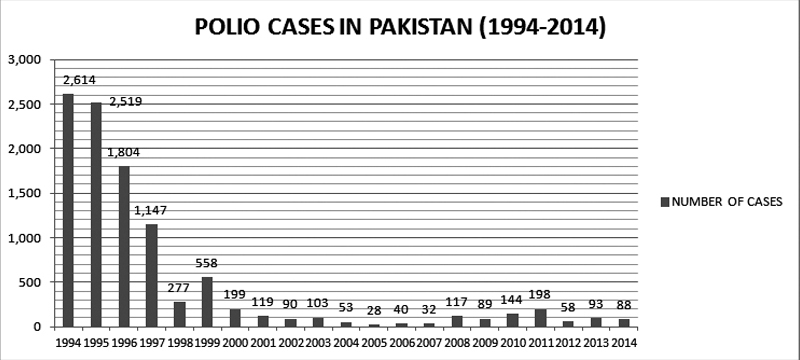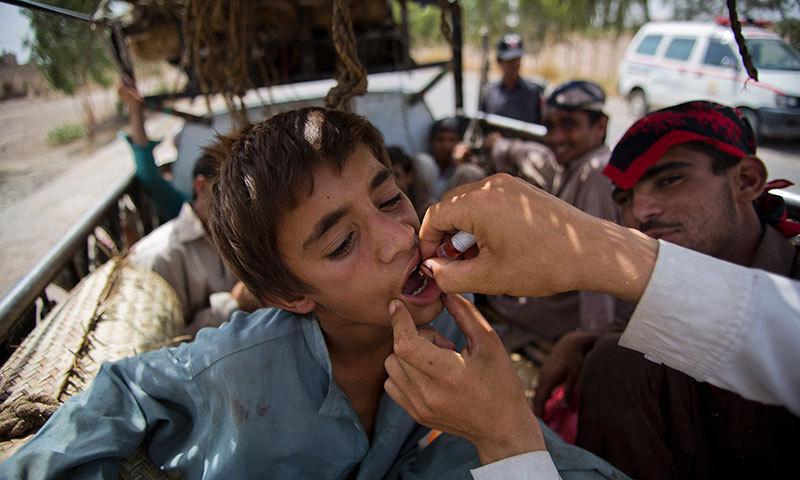KARACHI/ISLAMABAD: Taking advantage of the displacement of children in large numbers from North Waziristan due to the launch of a military operation there, health authorities have been able to vaccinate more than 192,442 previously unreachable children against polio, officials say.
“We take it as a huge opportunity to target all the children of North Waziristan Agency (NWA) who haven’t been exposed to a vaccine that could save them from being crippled for life,” a senior official in the Prime Minister’s Monitoring and Coordination Cell on Polio Eradication told Dawn.
Requesting anonymity because he was not authorised to speak to the media, the official said over 80,000 children were vaccinated at permanent transit points set up in FR Bannu, and around 20,000 in Hangu. The rest of the children were vaccinated in Dera Ismail Khan, Bannu and Lakki Marwat districts, he added.
Ayesha Raza Farooq, the focal person at the PM’s polio cell, said the government needed “at least 10 days to track the eventual destination of the displaced people” in order to keep administering vaccine doses to them. This would, however, have to be coupled with increasing the immunity of locals in the areas where the displaced population settle, she added.
Dr Rasheed Jooma, the former director-general of the health ministry, said vaccination drives must target both the IDPs and the populations which host them in order to properly eliminate the disease.
Also read: Polio may spread in wake of North Waziristan operation: UN
An official at the National Health Services ministry told Dawn on the condition of anonymity that the ongoing polio drive was not a spur of the moment initiative in response to the military operation, but it had been in the works “for long as part of the package to bring peace in the area”.
The World Health Organisation, which in May recommended a travel ban on those travelling from Pakistan without a valid polio vaccination certificate, says the displacement of the population has given a prime opportunity to vaccinate children who were otherwise inaccessible to health workers.
“There has been fundamental progress by reaching children in Peshawar and central Khyber Pakhtunkhwa through the Sehat Ka Insaf programme, reaching children in Bara with support of the UAE and the army,” Dr Elias Durry, the WHO Pakistan head for polio eradication, told Dawn.
“Now there is an opportunity for reaching children of North Waziristan who had to leave their homes while providing them with basic health care relief and services.”
The WHO travel restrictions currently require every person living in Pakistan for four weeks or more to carry a valid vaccination certificate to travel abroad.
 |
| Source: National Health Services |
QUESTION MARKS: When the restrictions came into effect from June 1, the WHO promised to review the sanctions after six months. “The programme goes through regular review and on a six-month basis by international experts [Technical Advisory Group on polio eradication]. The programme is in a better position than where it was six months ago, and we hope accessing more children in the coming months will put it in an even better position,” said Dr Durry.
Detractors, however, do not rule out the fact that the WHO deadline has a critical correlation with the security situation in the tribal areas. There remain question marks over the government’s ability to deliver, as critics are sceptical about the performance of fixed centres in the northwest for internally displaced children.
Editorial: Polio out of control
This is the third year running that the country has failed to reach about 350,000 children in Fata, where most of the country’s polio cases have been reported.
Federal and provincial authorities have, meanwhile, made arrangements with hundreds of centres assigned to administer the oral polio vaccine (OPV) to prospective international travellers and to issue them with vaccination (prophylaxis) certificates at hospitals and airports.
The setting up of this infrastructure has faced many teething problems. Arrangements have been rather adequate in large cities, but those in smaller towns and villages complain that they face problems in obtaining the prophylaxis cards. “I had to travel for many hours to reach Sialkot to receive polio certificate,” said Mohammad Saleem who went from Pasrur tehsil to one of the two centres in Sialkot to be able to leave for Belgium.
A slew of misconceptions about the safety of the vaccine and its dosage, too, are causing issues. Many people have been wary of being administered the OPV that they say can cause adverse effects in adults. Many families simply refuse to allow their children to be administered polio vaccine, while there are individuals who prefer inactivated or injectable polio vaccine (IPV) to OPV.
“I don’t know whether OPV is safe. I have read that it is somehow risky and IPV is safer. But then the government has not given us any option to pick one of the two vaccines,” said Jamal Mehmood, a resident of Karachi, who works in Sharjah.
Also read: PM to hold consultations with political parties
Dr Naseem Salahuddin, an expert in infectious diseases, told Dawn that IPV did provide a higher degree of immunity than OPV, and that in rare cases (one in 2.7 million) OPV had caused “negligible adverse effects”.
She added that this was only if the patient was already malnourished and feeble. She recommended the use of OPV, saying that it was “the best immunising tool” for Pakistan’s contaminated environment.
Dr Durry also said that OPV was “very effective” and posed “no danger” to adults.
Pakistan regularly recorded more than 2,500 polio cases a year until 1993. About 1,147 cases were reported in 1997, before the figures began to recede.
So far this year, there have been 88 cases reported: the highest in the world.
Of them, 66 were reported in Federally Administered Tribal Agencies (Fata), 15 in Khyber Pakhtunkhwa and seven in Sindh (all in Karachi).
Of the Fata cases, 54 were reported in North Waziristan. Three of the Sindh cases occurred in families who were originally from Fata.
According to the PM’s polio cell, none of the four children detected with polio only a day ago in Fata and Khyber Pakhtunkhwa had been vaccinated against the virus. The families of three of them simply refused to have them administered OPV despite repeated visits by health workers, while the fourth child could not be immunised in Fata because of Taliban’s opposition to vaccination.
While efforts are under way to vaccinate all the children including those who were previously inaccessible and now displaced from North Waziristan, as Dr Durry said, “reaching the last child always is a challenge that requires sustained commitment by all stakeholders”.
Published in Dawn, June 30th, 2014













































